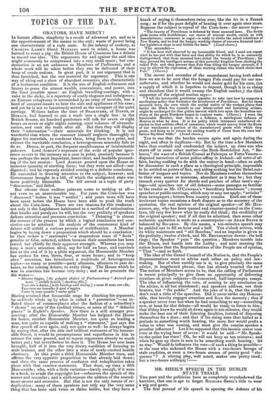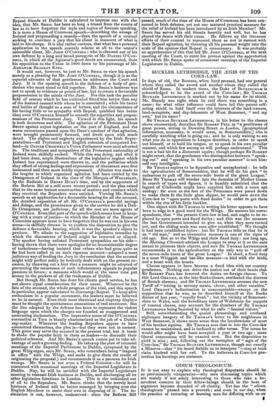MR. SHEIL'S SPEECH IN THE DUBLIN STATE TRIALS.
THE poet and the politician have so completely overshadowed the barrister, that one is apt to forget RICHARD SHELL'S title to wear a wig and gown.
The first perusal of his speech in opening the defence of his Repeal friends at Dublin is calculated to impress one with the idea, that Mr. SHEIL has been so long a truant from the courts of law as to have forgotten the style and topics of forensic speaking. It is more a House of Commons speech—describing the wrongs of Ireland and propounding a remedy—than the speech of a counsel seeking to convince a jury that his client is innocent of what is laid to his charge. It is also rather curious, that what has a personal application in the speech scarcely relates at all to the orator's ostensible client, Mr. Joss O'CONNELL; who is elbowed out of his own defence by a long and broad panegyric of Mr. DANIEL O'CON- NELL, it) which all the Agitator's good deeds are enumerated, from his opposition to the Union in 1800 down to his patronage of Mr.
ABRAHAM BRADLEY KING.
It would not, however, be just to Mr. SHEIL to view his speech merely as a pleading for Mr. JOHN O'CONNELL, though it is as the especial advocate of that gentleman he addresses the Court and Jury. It is the opening speech in the defence of a body of gen- tlemen who must stand or fall together. Mr. SHEIL'S business was not to speak to evidence or points of law, but to create a favourable prepossession in the minds of the Jury. For this task the peculiar field of oratory which'he has cultivated fitted him better than any of the learned counsel with whom he is associated ; while his tastes and habits of thought as a man of letters, and the circumstance of his having little or no sympathy with Repeal, qualified him better than even O'CONNELL himself to smooth the asperities and prepos- sessions of the Protestant Jury. Viewed in this light, his speech is both dexterous and able. The agitation of the Protestant Dean SWIFT against unjust legislation on the part of England, and the warm encomiums passed upon the Dean's conduct of that agitation, were brought prominently forward, and dwelt upon with much detail. The slights and neglects experienced by the Irish Repre- sentatives—all Protestant and English colonists of conquered Ire- land—in OLIVER CROMWELL'S Union Parliament were next adverted to. The traditions and sympathies of the Protestant nationality of Ireland were skilfully evoked. While this was doing, and after it had been done, ample illustrations of the legislative neglect which Ireland has experienced were thrown in, and the palliation which they afford of strong feelings and expressions of discontent were first insinuated and then more boldly expressed. Allusion was made to the lengths to which organized agitation had been carried by the Orangemen of Ireland in the time of the Marquis of WELLESLEY, by the Radicals in HENRY Hura's time, and by the supporters of the Reform Bill at a still more recent period; and the plea raised that to the same lenient construction of motives and conduct which they received the Repealers were entitled. Viewing Mr. SHEIL'S speech as an application for a favourable hearing for all the accused, the detailed exposition of all Mr. O'ConiveLes peaceful sayings and doings, and the prominence given to the service he did a Dub- lin Orangeman, are judicious ; for all the rest are mere agents of O'Cosseee. Even that part of the speech which seems least in keep- ing with a court of justice—in which the Member of the House of Commons appears most to have forgotten that he was not in his own arena—is skilfully thrown in to confirm the disposition to give the defence a favourable hearing, which it was the speaker's object to produce. We allude to the suggestion of legislative remedies by which the discontents of Ireland might be removed or allayed. The speaker having enlisted Protestant sympathies on his side— baying shown that there were apologies for no inconsiderable degree of turbulence—having insisted that others who had gone quite as far had been called to no such rigorous account—adopted a most judicious way of leading the Jury to the conclusion that the accused might with perfect safety be leniently dealt with on the present oc- casion, by throwing out a hint that a measure might be adopted of preventing the recurrence of such inflammatory appeals to popular passions in future; a measure which would at the same time put money in the pockets of all the tradesmen of Dublin.
But though Mr. SHEIL has done his clients good service, he has not shown equal consideration for their cause. Whatever be the fate of the accused, the whole progress of the trial, and this speech in particular, appear calculated to discourage Repeal. To keep alive enthusiasm in a popular movement, the leaders must be believed to be in earnest. Even their most theatrical and claptrap displays must be thought the spontaneous emanations of real sentiment. But the line adopted by the defence has been to represent the violent language upon which the charges are founded as exaggerated and unmeaning declamation. The impressive scene of the O'CONNELL coronation at Tara is bluntly characterized as the job of a Dublin cap-maker. Whenever the leading Repealers appear to have committed themselves, the plea is—but they were not in earnest. This game may serve the accused in the present trial, but it tends to shake the popular faith in them as leaders—to discredit their political schemes. And Mr. SHEIL'S speech comes pat to take ad- vantage of such a growing feeling. He takes up the plan of triennial meetings of the Imperial Parliament in Dublin, (proposed by the great Whig organ, says Mr. SHEIL, who remembers being "leagued in office" with the Whigs, and seeks to give them the credit of originating the proposal,) and recommends it as a panacea for Irish wrongs. Mr. SHEIL is not even a Federal Unionist—he will be
contented with occasional meetings of the Imperial Legislature in Dublin. Nay, he will be satisfied with the Imperial Legislature meeting to transact Irish business in Dublin, and discharging all its other legislative functions in London. This is the unkindest cut
of all to the Repealers. Mr. SHEIL thinks that the merely local business of Ireland will be better managed by bringing over the
English Members to assist their own in disposing of it. The in- sinuation is not, however, undeserved : since the Reform Bill
passed, much of the time of the House of Commons has been con- sumed in Irish debates, yet not one matured practical measure for the relief of Ireland has been introduced by an Irish Member! Mr. SHEIL has served his old friends heartily and well, but he has played the deuce with their cause. He follows up the incessant efforts of their counsel to represent them as not in earnest with their Repeal agitation, by throwing all his personal weight into the scale of the opinion that Repeal is unnecessary. It was probably an apprehension of this that led Mr. JOHN O'CONNELL, at the next meeting of the Court, to enter his protest against the approbation with which Mr. SHEIL spoke of occasional meetings of the Imperial Legislature in Dublin.



























 Previous page
Previous page